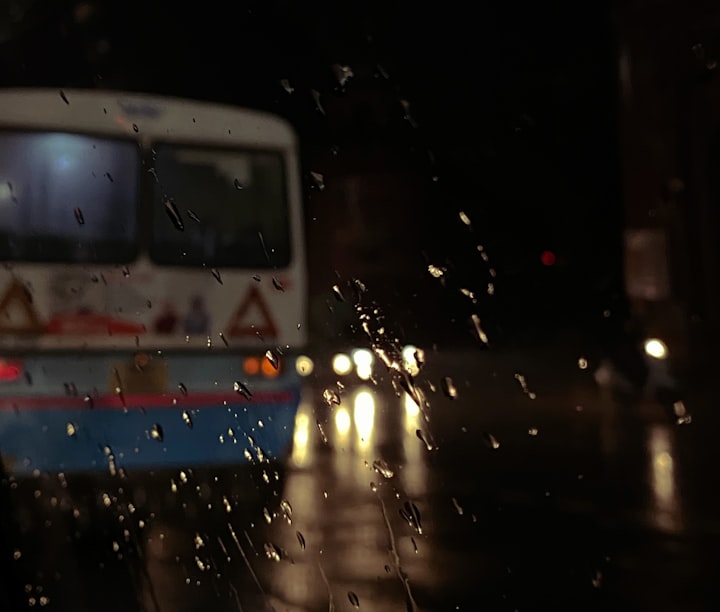Death Wears a Crown of Flowers
Agatha slowly realizes where she is.

“...hear me?”
A voice, calling to her through the deep, the sunlight-suffused water, the white-hot corridor through hell.
Agatha’s eyes fly open. She’s on the ground, limbs splayed gracelessly, asphalt digging into her hip. Above her hovers a small, round face, a ring of fire, a spinning blue sky.
The clouds slowly settle, and the face comes into focus—a child, peering with an almost-comical solemnity into her face, with a crown of fresh marigolds nestled into his finely-spun, light brown hair.
He extends a pudgy, dirt-smeared hand. “I wasn’t sure if you were done,” he informs her.
Agatha blinks at the proffered hand, before pushing herself up slowly into a sitting position.
“I… What happened?” She stammers. As she asks the question, the floodgates of her mind open, and she remembers, in fits and starts—speeding down the boulevard, her eyelids drooping, her hazy thoughts bent toward home and dinner and bed.
“Oh my god,” Agatha murmurs, rising unsteadily to her feet. “My car.” She looks around. “I… Where are we? I don’t recognize this place.”
They’re standing on what appears to be an unpaved road, winding around the foot of a mountain. Overhead, a tightly-woven canopy of foliage stirs in the dry, odorless wind, rattling, sighing; along the edges of the sandy, pebble-strewn road, riotous wildflowers and grasses crowd in, reaching silently for the sun.
“You know where we are,” the child responds.
“What?” Agatha turns, frowning. “No, I don't."
The child stuffs his hands into the pockets of his faded, threadbare overalls and pushes his bottom lip out, stubbornly silent. Agatha tilts her head back, staring up through the unfamiliar trees, at the distant chalky peak of the mountain.
There are no mountains anywhere near her home.
She turns to squint down the road. “What’s in that direction?”
The child rubs his nose. “The ocean.”
There is no ocean anywhere near her home, either. Agatha points in the other direction, where the road curves, disappearing into the trees. “And what’s down there?”
“The fog.”
“Fog?” Agatha begins walking, stumbling over the loose pebbles in her work heels.
“You can’t go back that way,” the child calls after her, but she continues on, increasing her pace. She rounds the bend in the road, and stops, staring.
The road tumbles down into the valley, winding up and around rolling hills, before terminating in a dense, pale gray fog that hangs ominously still in the eddying valley air.
The child pitters up to her. “I told you,” he chides. “You can’t go back that way.”
Agatha shakes her head. “I didn’t come from there. I was driving home from work, I was…”
“Everyone comes through the fog,” the child replies. “But no one goes back. It’s against the rules.”
“What rules? What is this? Where am I?”
The child gives her a hard look. “You know where we are.”
“Stop saying that!” Agatha snaps, before turning and marching down the path. She slips over loose gravel, kicks off her heels and sweeps them up in a huff, and veers off the winding path, cutting instead through the knee-high grass, barefoot, ignoring the poking heads and spiky leaves of weeds. The child says nothing, only hurries along the path on his stubby legs, trying to keep up. He stops when they reach the edge of the fog, the point where the path begins to fade away, but Agatha plunges in without looking back.
The fog quickly becomes too dense to see in, so Agatha slows her pace, her hands outstretched before her, her heels clutched in her hands like weapons. The ground beneath her feet becomes smooth, then rough with pebbles and stray patches of scrabbly grass; the air turns sweet, then stale, flat.
And, before she knows it, she’s stumbling out of the fog, nearly slamming into the child.
“I told you,” he says, annoyed, moving out of her way, “that no one ever goes back.”
Agatha turns to stare into the impenetrable fog. “But I have to get back. I’ve so much work to do. And Bob...”
“Bob?” The child asks. “The man you’ve been cheating on?”
“I haven’t—” Agatha sputters. “How can you possibly know about that?”
“Agatha,” the child says, his expression turning solemn once again, his young voice at odds with the seriousness of his tone. “You really can’t go back. You can only go on to what’s next.”
“I...I can’t leave. There’s so much...”
“It’s too late.”
“No.” Agatha shakes her head. “It can’t be too late.”
“I’m sorry.”
“You don’t understand,” Agatha persists, hearing the desperation in her own voice, hating it. “I didn’t mean for things to end this way.”
“No one does.”
“I have to explain to him, I didn’t mean for things to get this far. Oh, god, what if he finds out?”
The child reaches out and takes her hand. “He’ll be okay. And so will you.”
Agatha looks up, away from the fog, to where the path disappears around the foot of the mountain.
“The ocean, then?” She mutters. The child nods.
They walk together silently, up the path, around the mountain, out into a flat, shifting sandscape, gleaming white under the sun. On the rim of the horizon, the ocean slowly comes into focus, a thin line of metal.
They continue on, working their way slowly across the sand, and the ocean, dark and unnervingly still, grows in size until the damp, rocky shore is under Agatha’s bare feet, until the endless water and interminable silence are impossible to escape.
The ocean is nothing like it’s supposed to be. Agatha remembers distantly, as one might remember a long-deceased acquaintance, her only experience of an ocean, from her only trip to Hawaii. It had been a living thing, cleansing and treacherous, pushing and pulling, ever catching and throwing sunlight, ever resisting and capitulating to the wind and the moon and the infinite creatures slicing through its depths. It had been a source of awe and inspiration, a primordial force utterly and beautifully beyond her control, a mythical phenomenon suddenly made real.
This ocean, this endless expanse of dark, colorless water, silent, motionless, dead—this thing only fills Agatha with terror.
She lifts her eyes and sees a rowboat moored a short distance away, sitting motionless on the surface of the water.
“I don’t want to go,” she says, her voice almost entirely swallowed up by the blank, voracious horizon.
“No one does.” The child dips his toe in the water nonchalantly.
“There’s no way I can go back?”
“Does it help to know that everyone always has regrets?”
Agatha frowns. “No. It doesn’t.”
The child shrugs. “Well, that’s okay.”
“Do I...I don’t know, become a ghost?” Agatha asks. “Do I get reincarnated as a tree? What happens now?”
“I can’t tell you.”
“Why not? I’m already—” Agatha swallows. “I’m already dead, aren’t I?”
“I can’t give you the answers. That’s cheating.”
“Why not?” Agatha explodes. “Why can’t I have answers? Why aren’t we allowed to know? Who are you to keep these things from me?”
“I am death,” the child answers, unperturbed. “Everyone must come through me. I don’t owe you anything.”
He turns, gestures at the ocean. “If you want answers so badly, the sooner you get across, the sooner you’ll know.”
Agatha turns to squint at the horizon, subdued, uncomfortable. As far as she can tell, there isn’t an other side to this ocean; as far as she can tell, she’ll be rowing for the rest of eternity.
“Will I ever see Bob again?” She asks, her voice small.
The child doesn’t answer for a long time. “In a way, that’s up to you,” he finally says.
“When you see him...could you tell him that I’m sorry?”
“I’m not a messenger,” he replies testily. “You’ll have to say it to him yourself.”
Agatha hangs her head.
“It’s time to go,” he says, gentler now. Agatha sucks in a deep breath, rolls back her shoulders, nods. She picks her way over to the boat, places her shoes in the bottom, seats herself gingerly, picks up the oar.
She turns to look once more at the mountain in the distance, the white sand, the rocky beach, the child with ageless eyes.
She unmoors the boat and begins rowing. The water offers little resistance as she glides out into the ocean. Wavelets fan out silently in the wake of the boat, falling away quickly into the distance. When she looks over her shoulder, she sees the bright, warm ring of marigolds in the child’s hair, a beacon of color on the otherwise-colorless shore.
She turns her back on him and pushes on.
About the Creator
GT Caruthers
Twitter: @gtcaruthers






Comments
There are no comments for this story
Be the first to respond and start the conversation.